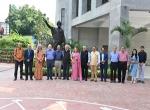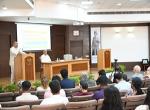‘Breaking India – Western Interventions in Dravidian and Dalit Faultlines’a book jointly authored by Rajiv Malhotra, chief of the Princeton based Infinity Foundation and a Distinguished Fellow, Vivekananda International Foundation (VIF) and Aravindan Neelakandan, intellectual activist, columnist and popular science writer from Tamil Nadu, was released at VIF auditorium on 9th February, 2011. A galaxy of speakers participated in the discussion on the theme of the book.
While releasing the book eminent international jurist and Member of Parliament Shri Ram Jethmalani said that it is ‘an eye opener, a warning to us’ of not only internal enemies but external ones too who are collaborating with dummies, proxies inside our border and trying to weaken India, break her unity, integration and ultimately to jeopardise our freedom, sovereignty, culture. Mentioning the area of South Asian studies in Western universities, as discussed in the book, Jethmalani said that South Asian Studies in Western universities often invite those organisations and individuals who, in India, give support to separatists and terrorists. He said the book dwells in great details on 3 principal threats to India – such as the Islamist radicals spawned in the neighbouring countries and elsewhere, the Maoists used as a pawn by China to further its design and finally groups that are trying to create a new race of Dravidians by taking into account the large body of Dalits and instigating separatism and further weakening the country. ‘The greatest success of those who wish to break India’, he said, ‘will be when we cease to be ourselves, give up our culture’.
Shri Aravindan Neelankandan while stating the thesis of the book said that it essentially seeks to put in spotlight foreign based organisations that seek to shape and govern certain political and ideological movements inside India so that hatred and violent conflicts can be generated inside Indian communities leading to eventual balkanization of the country. ‘We wrote the book for all Indians for you and me because we do not want our children to end up in refugee camps’, he argued. Neelakandan also quoted noted Tamil epigraphist and leftist scholar S.Ramachandran as saying after reading the book, that foreign interventions in the Dravidian movement were assiduously traced and documented by early Marxist scholars but that regretfully the present Marxists have been co-opted by that same divisive doctrine.
Shri S. Gurmurthy noted public intellectual, columnist and financial analyst, in his intervention observed that Tamil Nadu has always been the playground of Dalit politics. And the people’s emotional attachment to their language has been transformed into some kind of racial, ethnic identity, which was promoted, funded, weaponised by political ideologies. He said how the introductory passage in the classic Tolkapiyyam which stated that the work was for all who have studied the four Vedas was removed for the last fifty years from editions of the book in order to generate and create animosity and division He observed that ‘An idea weaponised in politics can transform a society into hating mutually each other’. Talking about the plight of Dalits group in Tamil Nadu he said how they have been converted into private armies, ‘there are at least 1000 Dalit orgnisations and parties in Tamil Nadu,’ he said, ‘some of them come to me and weep and say we have been converted into a private army, there are large cases against us, we have been turned into prisoners of the police, Dravidian parties and the Church, how can you help us. A private army has been created through state patronage and outside intervention and they are the ones who are giving private justice’ today through various violent means he said. Shri Gurumurthy found the book’s portrayal of the destructive work that foreign intervention is doing in Tamil Nadu to be meticulous. He concluded by saying that ‘Breaking a civilisation is like breaking the backbone of a people – civilisational identity is what makes us share different things and makes us feel one. By breaking it one not only disturbs the oneness but also brings about separation in warring groups’. He felt that the book needs to be read with deep contemplation.
Vice-Admiral (retd) Raman Puri, deplored the trend of de-Sanskritisation that had set in the country and observed that that such a process was divorcing us form our civilisational roots. Referring to an area – defence production – that is still to be indigenized and where large and powerful foreign players remain active he wondered why even after six decades we have not been able to reverse this trend and have kept ourselves open to external manipulation and control. He also pleaded for a re-look at the Indian Constitution and asked whether it could really reflect and tackle the realities of today.
Professor Upendra Baxi, former Vice-Chancellor, Delhi University, in his argument said that the book essentially focuses on 3-S: subordination of India’s independence, surveillance of independent India and subversion of independent India. The reader would do well to keep these in mind while reading it. The intention of the book is to start a debate in a nation which knows only polemics and in that situation no dialogue is possible. Professor Baxi wondered what M’s [Mohandas Karamchand Gandhi] would have said of the book and the theme it dealt with!
Shri Rajiv Malhotra presented a whole background to the book and his experiences and findings while working on it. Among some of the revelatory points he made, was the state of South Asian studies in the West. He argued that while China takes an active interest in supporting, monitoring and controlling the China studies discourse in the West, India has perennially shown a lack of initiative on this front. India has allowed it to be controlled by groups who possess their own marked out political tendencies and objectives. Objectives which are often inimical to India by working to widen her fault lines.






